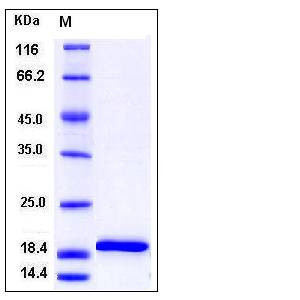Mouse IL-1 beta / IL1B Protein
Il-1b,IL-1beta
- 100ug (NPP1809) Please inquiry
| Catalog Number | P50101-MNAE |
|---|---|
| Organism Species | Mouse |
| Host | E. coli |
| Synonyms | Il-1b,IL-1beta |
| Molecular Weight | The recombinant mouse IL1β consists of 153 amino acids and has a predicted molecular mass of 17.5 kDa. It migrates as an approximately 19 kDa band in SDS-PAGE under reducing conditions as predicted. |
| predicted N | Met |
| SDS-PAGE |  |
| Purity | > 97 % as determined by SDS-PAGE |
| Protein Construction | A DNA sequence encoding the mature form of mouse IL1β (P10749) (Val 118-Ser 269) was expressed, with an initial Met at the C-terminus. |
| Bio-activity | 1. Measured in a cell proliferation assay using D10.G4.1 mouse helper T cells. The ED50 for this effect is typically 2-10 pg/mL. 2. Measured by its ability to bind human IL1R1 in a functional ELISA. 3. Measured by its ability to bind mouse IL1R1 in a functional ELISA. |
| Research Area | Cardiovascular |Atherosclerosis |Vascular Inflammation |Inflammatory mediators |
| Formulation | Lyophilized from sterile PBS, pH 7.4 1. Normally 5 % - 8 % trehalose, mannitol and 0.01% Tween80 are added as protectants before lyophilization. Specific concentrations are included in the hardcopy of COA. |
| Background | Interleukin-1 beta (IL1 beta or IL1B) also known as catabolin, is a member of the interleukin 1 cytokine family. IL1 is a pleiotropic cytokine. It is involved in the inflammatory response, cell growth, and tissue repair in the cortex. The IL1 superfamily consists of three members, IL1A (IL1 alpha), IL1B (IL1 beta), and IL1 receptor antagonist (IL1Ra). In clinical, it has been reported that Interleukin (IL)-1 may influence Th1 / Th2 immune responsiveness and has been implicated in the establishment of successful pregnancy. Proinflammatory interleukin (IL)-1 gene polymorphisms associated with high levels of IL-1beta activity increase the risk for hypochlorhydria and distal gastric carcinoma. IL1B polymorphisms may be involved in susceptibility to SSc. Moreover, the IL2-384-G allele may be a marker for the limited phenotype of systemic sclerosis (SSc). |
| Reference |
